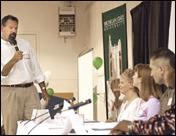Making the Rounds: Child Welfare Learning Collaborative
- Gary R. Anderson
- Jo Ann P. McFall
- David G. Knaggs
- School of Social Work
- College of Social Science

John Seita, a Social Work faculty member who works with the Child Welfare Learning Collaborative, talks to a panel of former foster children at a CWLC event.
The director of MSU's School of Social Work, Gary Anderson, and his colleagues are all about making connections—between academic disciplines, education and research, policy and practice. To advance the welfare of disadvantaged and vulnerable families, Dr. Anderson and the School's faculty members have helped to forge numerous creative partnerships in support of this goal, from post-adoptive family services to reintegration of ex-offenders, kinship care, foster care, and geriatric programs.
Jo Ann McFall, Associate Director for Field Education in the School of Social Work, matches students with appropriate agency field experiences. In addition to a professional interest in curriculum development and educational outcome assessment, she has 25 years of clinical experience and teaches the advanced clinical methods courses at the School.
David Knaggs is a Social Work clinical instructor with an interest in asset-based social change through integration of scholarship with best practices in the field.
Anderson, McFall, and Knaggs were key players in developing the Child Welfare Learning Collaborative (CWLC), a partnership among the School of Social Work, University Outreach and Engagement, and St. Vincent Catholic Charities (STVCC) of Lansing.
The Collaborative is a teaching initiative that places MSU faculty and students in STVCC's out-of-home treatment center, working with children and families who have experienced a range of challenges including child abuse and neglect. The initiative was built on a longstanding association between University-Community Partnerships (part of MSU's Office of University Outreach and Engagement) and STVCC. David Knaggs, who has held appointments in both Social Work and University Outreach and Engagement, facilitated the project's development.
The program is modeled in part after the practice of "grand rounds" in medical teaching hospitals, which bring academic and practitioner experts together to share knowledge and review cases. The CWLC's grand rounds presentations are offered to agency staff, MSU faculty and students, and, occasionally, foster parents. Topics range from brain development to coping with challenging adolescent behavior.
STVCC has become the largest field placement opportunity for social work students in Michigan. During the 2004-2005 academic year 26 students were placed at the agency, which provided 780 hours of professional supervision to them. In turn the students gave 12,480 hours of service to clients and their families. The students gain field experience; the faculty gain an opportunity to do collaborative, agency-based research; and the agency staff gain access to the University's expertise network.
Knaggs said, "The whole idea evolved from a conversation between Annette Abrams and Sherri Solomon.* Drawing on her experience as a former nurse, Sherri asked, 'Are there teaching service agencies that train service professionals onsite, like teaching hospitals?' We did a literature review on the topic, and we found no existing university-agency relationship anywhere in the country that used anything analogous to a teaching hospital format."
Solomon said, "The Collaborative has enabled our agency to improve its quality of care in spite of budget cuts. Our staff are exposed to current research regarding best practices and policy implementation. They have the opportunity to attend workshops and case presentations with specialists. It's a great synergy."
Anderson agreed. "When things go right in foster care, we ask what happened and how can we do more of that? Our joint goal is to find ways of connecting research with real life experiences. This project has shown that when we nurture strong collaborative relationships with external groups our outreach efforts can result in clear positive benefits for all participants. This effort has benefited MSU in all three major areas of its responsibility—scholarship, teaching, and service," he said.
- Written by Linda Chapel Jackson, University Outreach and Engagement